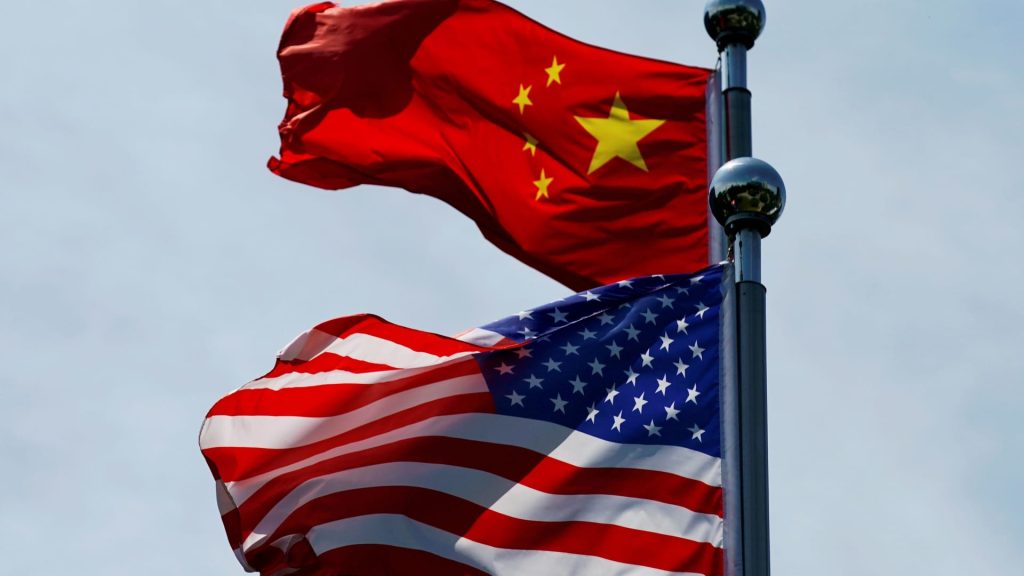Chinese and U.S. flags flutter near The Bund, before U.S. trade delegation meet their Chinese counterparts for talks in Shanghai, China July 30, 2019.
Aly Song | Reuters
BEIJING — Nearly half of U.S. businesses have redirected planned China investments to other regions over the past year — highest on record — the American Chamber of Commerce in Shanghai said Wednesday.
The business chamber’s survey of members came shortly after an escalation in U.S.-China trade tensions and a temporary rollback of some tariffs from mid-May. The two countries last month agreed to extend the trade truce by another 90 days, to mid-November.
“For a company, 90 days, that’s just way too short,” Eric Zheng, President of AmCham Shanghai, told reporters, pointing out that the supply chain planning is far longer term.
“At least we don’t need to deal with even higher tariffs [for now], but the issue is not going away, it’s still here,” Zheng said.
As many as 47% of the respondents in the survey, conducted from May 19 to June 20, said that they had diverted investments planned for China primarily to Southeast Asia. That’s the highest share since the survey first featured the question about plans to shift investments away from China in 2017.
The Indian subcontinent, which includes Bangladesh, was the second-most popular destination for redirected investments, while the U.S. and Mexico were tied at the third spot.
U.S. President Donald Trump has sought to encourage businesses to bring manufacturing back to America, with Trump criticizing Apple‘s plans to expand production in India. A few companies, especially in advanced technology, have made high-profile announcements to invest in the U.S.
AmCham Shanghai’s members include Apple, Ford, Honeywell, Meta and Tesla. Jeffrey Lehman, the business group’s chair, pointed out that members are affected not just by U.S. tariffs on China, but Beijing’s retaliatory duties, since materials needed to build the product often come from the U.S.
U.S. tariffs on Chinese goods stand at nearly 58%, while China’s levies are around 33%, according to the U.S.-based Peterson Institute for International Economics. Tariff rates can vary by product.
Nearly two-thirds, or 65%, of the respondents said the current tariffs were hurting them significantly, especially those in manufacturing, Zheng said Wednesday on CNBC’s “The China Connection.”
Competition in China’s domestic market is also increasing, while confidence about the five-year local business outlook hit a record low for a fourth-straight year, the AmCham Shanghai study found.
Only 28% of the respondents said that their China operating margins in 2024 were higher than that of their global business, while 33% said their China performance was actually worse.
U.S. companies also said their Chinese competitors were more advanced in six out of eight categories, especially speed to market and adoption of artificial intelligence. About 41% of the respondents said Chinese companies were more advanced in adopting AI, with that share rising to 62% in the retail and consumer industry.
“We see AI as another area that we can compete here in China, but then we need to figure out a way,” Zheng said. “On the one hand we have to be compliant because there are certain export control rules that we have to follow as American companies. At the same time, we need to continue to explore potential opportunities in this country including working with Chinese partners.”
AmCham Shanghai members saw themselves leading their Chinese peers by a good margin only on product quality and development metrics.
Improving business environment
While trade tensions and worries about China’s economic slowdown weighed on the near-term outlook, the survey respondents indicated significant improvement in the local regulatory environment.
Nearly half, or 48%, said that the regulatory environment was transparent for their industry, a large jump from just 35% in 2024. The share of businesses saying that lack of transparency was hindering operations fell by 12 percentage points to 16%.
The share of respondents indicating that foreign and local companies were treated equally rose by 5 percentage points to 37%.
Beijing in recent years has ramped up its efforts to attract and retain foreign investment, with increased engagement and friendlier policy announcements. Earlier this year, China released an “action plan” that included measures for making it easier for foreign businesses to invest in biotechnology, while clarifying standards for government procurement.
However, the AmCham Shanghai survey found 14% of the respondents reported the environment for foreign businesses in China was worsening, with the tech sector seeing the highest challenges at 31% of industry respondents.
— CNBC’s Victoria Yeo contributed to this report.


